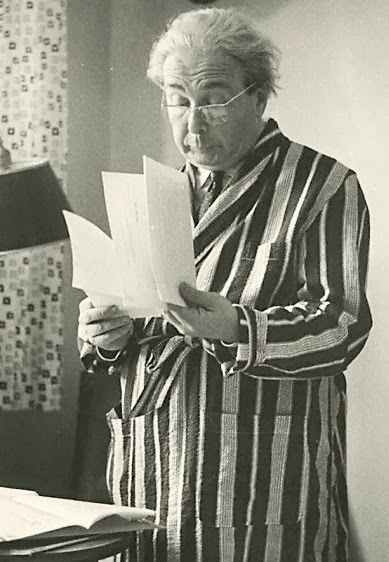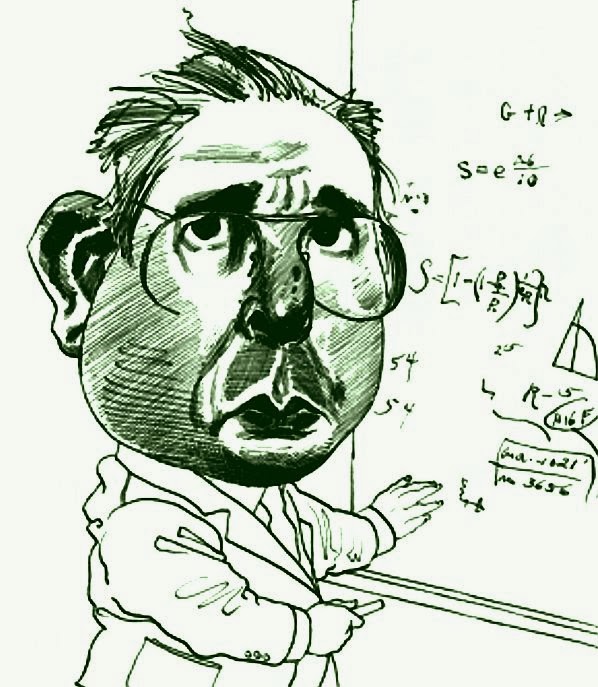Philosophy


by
Gary Robbins
February 5th, 2014
The San Diego Union-Tribune
UC San Diego's Geisel Library has received a grant of nearly $100,000 to digitize the papers and materials of Leo Szilard, the late physicist whose work on nuclear chain reactions helped lead to the Manhattan Project, the program that produced the country's first atomic bombs.
The library's Mandeville Special Collections has more than 50,000 items involving Szilard, who spent part of the 1950s as a consultant at General Atomics in San Diego before going on to become one of the first fellows at the Salk Institute of Biological Sciences in La Jolla. Szilard, who had a deep interest in biology as well as physics, died in La Jolla in May 1964 at the age of 66.
The National Historical Publications and Records Commission gave the grant to the University of California San Diego, whose library also houses major collections of papers from Nobel laureates Francis Crick, Harold Urey and Maria Goeppert Mayer, polio vaccine developer Jonas Salk, and children's author Theodor Seuss Geisel.
"The public is going to have access not only Szilard's creations, but to documents that show the process of that creation," said William Lanouette of San Diego, author of "Genius in the Shadows: A Biography of Leo Szilard, the Man Behind the Bomb."
Lanouette will give a public speech about Szilard's life and career on March 5th at the UC San Diego Faculty Club, starting at 11 a.m.
Szilard changed the course of history in 1933 when he came up with the basic idea for nuclear chain reaction, which he later patented with physicist Enrico Fermi. Six years later, Szilard worked with Albert Einstein on a draft of a letter to President Franklin D. Roosevelt that specified how the breakthrough might be used to develop nuclear weapons. A formal later was later sent to Roosevelt, leading to the creation of the Manhattan Project.
Szilard was a major behind-the-scenes contributor to the project. But he ended up lobbying the government hard against using atomic bombs against Japan, a campaign that proved to be unsuccessful.
- Deceased--james Arnold
James ArnoldMay 5th, 1923 to January 6th, 2012"James Arnold dies at 88; pushed to unlock secrets in moon rocks"Nuclear chemist James Arnold, whose efforts helped lead NASA to preserve and analyze a treasure trove for lunar research, also founded UC San...
- Samuel A. Goudsmit Papers Available Online Via Aip
"AIP's Niels Bohr Library Makes Goudsmit Papers Available Online" Papers document history of frontier physics research July 26th, 2011 PRNewswire The Niels Bohr Library and Archives of the American Institute of Physics (AIP), has digitized...
- Deceased--herbert York
Herbert York Novemeber 24th, 1921 to May 19th, 2009 "Herbert York dies at 87; scientist and arms-control leader" Herbert York, who was a delegate to the anti-satellite arms control talks in 1978 and chief negotiator in the U.S.-Soviet talks on a ban...
- Enrico Ferimi And Winnie The Pooh
Nothing to be ashamed about...Enrico Ferimi liked Winnie the Pooh. I'm sure we all have a fondness for something that may be a a little bizarre. "The role Winnie the Pooh played in the atomic bombing of Japan is not widely known. But when Enrico...
- Nuclear Weaponry
"Russell-Einstein Manifesto" A Plea for Nuclear Arms Control July 9, 1955 Perry W. Bridgman Max Born Frederic Joliot-Curie Albert Einstein Leopold Infeld Herman J. Muller Linus Pauling Cecil F. Powell Joseph Rotblat Bertrand Russell Hideki Yukawa "Here,...
Philosophy
Leo Szilard's papers to be online


"UCSD to digitize Szilard papers"
by
Gary Robbins
February 5th, 2014
The San Diego Union-Tribune
UC San Diego's Geisel Library has received a grant of nearly $100,000 to digitize the papers and materials of Leo Szilard, the late physicist whose work on nuclear chain reactions helped lead to the Manhattan Project, the program that produced the country's first atomic bombs.
The library's Mandeville Special Collections has more than 50,000 items involving Szilard, who spent part of the 1950s as a consultant at General Atomics in San Diego before going on to become one of the first fellows at the Salk Institute of Biological Sciences in La Jolla. Szilard, who had a deep interest in biology as well as physics, died in La Jolla in May 1964 at the age of 66.
The National Historical Publications and Records Commission gave the grant to the University of California San Diego, whose library also houses major collections of papers from Nobel laureates Francis Crick, Harold Urey and Maria Goeppert Mayer, polio vaccine developer Jonas Salk, and children's author Theodor Seuss Geisel.
"The public is going to have access not only Szilard's creations, but to documents that show the process of that creation," said William Lanouette of San Diego, author of "Genius in the Shadows: A Biography of Leo Szilard, the Man Behind the Bomb."
Lanouette will give a public speech about Szilard's life and career on March 5th at the UC San Diego Faculty Club, starting at 11 a.m.
Szilard changed the course of history in 1933 when he came up with the basic idea for nuclear chain reaction, which he later patented with physicist Enrico Fermi. Six years later, Szilard worked with Albert Einstein on a draft of a letter to President Franklin D. Roosevelt that specified how the breakthrough might be used to develop nuclear weapons. A formal later was later sent to Roosevelt, leading to the creation of the Manhattan Project.
Szilard was a major behind-the-scenes contributor to the project. But he ended up lobbying the government hard against using atomic bombs against Japan, a campaign that proved to be unsuccessful.
- Deceased--james Arnold
James ArnoldMay 5th, 1923 to January 6th, 2012"James Arnold dies at 88; pushed to unlock secrets in moon rocks"Nuclear chemist James Arnold, whose efforts helped lead NASA to preserve and analyze a treasure trove for lunar research, also founded UC San...
- Samuel A. Goudsmit Papers Available Online Via Aip
"AIP's Niels Bohr Library Makes Goudsmit Papers Available Online" Papers document history of frontier physics research July 26th, 2011 PRNewswire The Niels Bohr Library and Archives of the American Institute of Physics (AIP), has digitized...
- Deceased--herbert York
Herbert York Novemeber 24th, 1921 to May 19th, 2009 "Herbert York dies at 87; scientist and arms-control leader" Herbert York, who was a delegate to the anti-satellite arms control talks in 1978 and chief negotiator in the U.S.-Soviet talks on a ban...
- Enrico Ferimi And Winnie The Pooh
Nothing to be ashamed about...Enrico Ferimi liked Winnie the Pooh. I'm sure we all have a fondness for something that may be a a little bizarre. "The role Winnie the Pooh played in the atomic bombing of Japan is not widely known. But when Enrico...
- Nuclear Weaponry
"Russell-Einstein Manifesto" A Plea for Nuclear Arms Control July 9, 1955 Perry W. Bridgman Max Born Frederic Joliot-Curie Albert Einstein Leopold Infeld Herman J. Muller Linus Pauling Cecil F. Powell Joseph Rotblat Bertrand Russell Hideki Yukawa "Here,...
